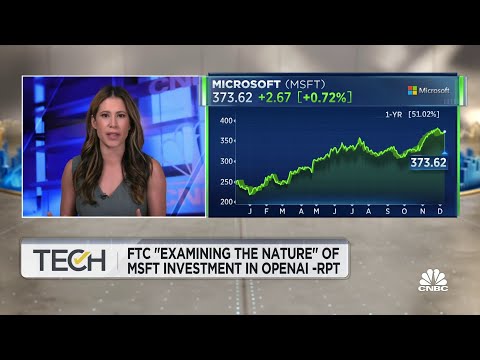FTC Probe Into OpenAI: Examining ChatGPT's Data Practices And Privacy Concerns

Table of Contents
ChatGPT's Data Collection Methods: A Deep Dive
ChatGPT's impressive capabilities stem from its training on a massive dataset, raising crucial questions about data sourcing and user privacy. Understanding how this data is collected is essential to assessing the potential risks.
Training Data and Source Material
ChatGPT's training involved vast amounts of data scraped from the internet, including websites, books, code repositories, and more. This raises several significant issues:
- Copyright and Intellectual Property: The use of copyrighted material without explicit permission presents substantial legal challenges. Determining fair use in the context of AI training remains a complex legal battleground.
- Bias and Inaccuracy: The data used for training inevitably reflects existing biases present in the source material. This can lead to ChatGPT generating biased or inaccurate responses, perpetuating harmful stereotypes and misinformation.
- Lack of Transparency and Attribution: The opacity surrounding the exact sources of the training data makes it difficult to identify and address issues related to copyright infringement, bias, and factual inaccuracies. OpenAI hasn't provided a comprehensive list of its data sources.
User Data Collection
Beyond its training data, ChatGPT also collects user data during interactions:
- Prompts and Responses: Every user interaction, including the questions asked and the answers generated, becomes part of OpenAI's data pool.
- Usage Patterns: Data on how users interact with ChatGPT—frequency of use, types of prompts, etc.—is also collected.
- IP Addresses and Location Data: This data can be used to identify users and potentially track their online activity. While often anonymized, this information still carries privacy implications.
- Storage and Retention: The methods OpenAI uses to store and retain this data, and for how long, are not fully transparent. This lack of transparency raises concerns about data security and potential misuse.
Data Anonymization and Security
OpenAI claims to employ data anonymization techniques to protect user privacy. However, the effectiveness of these measures is debatable:
- Limitations of Anonymization: Perfect anonymization is exceptionally difficult, and even seemingly anonymized data can be re-identified through advanced techniques.
- Security Vulnerabilities: Like any system dealing with large datasets, ChatGPT is vulnerable to data breaches and hacking attempts. OpenAI's security protocols need to be rigorously tested and improved.
- Lack of Independent Audits: The lack of independent audits of OpenAI's data security and anonymization practices raises questions about the trustworthiness of their claims.
Privacy Concerns and Potential Violations
The FTC investigation focuses heavily on potential violations of existing privacy regulations. The issues go beyond simple data collection.
COPPA and Children's Data
ChatGPT's accessibility to minors raises serious concerns regarding compliance with the Children's Online Privacy Protection Act (COPPA):
- Age Verification: OpenAI lacks robust mechanisms for verifying the age of users, putting children's data at risk.
- Parental Consent: The collection and use of children's data without parental consent is a clear violation of COPPA.
- Data Protection for Minors: Even with anonymization, the potential risks to children's data are significant, considering their vulnerabilities.
GDPR and International Data Protection Laws
OpenAI's data practices also face scrutiny under the General Data Protection Regulation (GDPR) and other international data protection laws:
- Data Transfer: The transfer of user data across international borders raises concerns about compliance with data sovereignty regulations.
- User Rights: Users' rights to access, rectify, and erase their data are not always straightforward to exercise with a large language model.
- Non-Compliance Penalties: Non-compliance with GDPR and similar regulations can lead to substantial fines and reputational damage.
The Right to be Forgotten
Implementing the "right to be forgotten" presents unique challenges in the context of large language models:
- Data Permanence: Once user data is integrated into the training model, removing it completely is extremely difficult, if not impossible.
- Data Fragmentation: User data might be spread across multiple parts of the model, making complete removal a complex and potentially unachievable task.
- Impact on Model Accuracy: Removing data might negatively affect the model's accuracy and performance.
The FTC's Investigation and Potential Outcomes
The FTC's investigation is wide-ranging and could have significant consequences for OpenAI and the AI industry as a whole.
The Scope of the Investigation
The FTC is reportedly scrutinizing various aspects of OpenAI's data practices, including:
- Data Collection Methods: The legality and ethical implications of the data sources used to train ChatGPT are under close examination.
- Privacy Policies: The clarity and comprehensiveness of OpenAI's privacy policies, and their compliance with existing regulations, are being investigated.
- Data Security Measures: The effectiveness of OpenAI's data security measures and their ability to protect user data from breaches are being assessed.
Possible Penalties and Sanctions
If found in violation, OpenAI faces a range of potential penalties:
- Substantial Fines: The FTC has the power to impose significant financial penalties for non-compliance.
- Injunctions: The FTC could issue injunctions requiring OpenAI to make changes to its data practices.
- Mandated Changes to Data Practices: OpenAI might be forced to implement stricter data security and privacy measures.
- Reputational Damage: The investigation itself could damage OpenAI's reputation and trust among users.
Implications for the AI Industry
The FTC's investigation sets a crucial precedent for the future of AI regulation:
- Increased Scrutiny: Other AI companies will likely face increased scrutiny of their data practices.
- Stricter Regulations: The investigation could lead to the development and implementation of stricter regulations governing AI data handling.
- Impact on Innovation: While increased regulation is necessary, it could also stifle innovation if not carefully balanced.
Conclusion
The FTC's probe into OpenAI's data practices surrounding ChatGPT underscores the critical need for responsible AI development and robust regulatory frameworks. The outcome will significantly shape the future of AI, setting precedents for data privacy and security in the industry. OpenAI's response and the FTC's actions will be pivotal in determining how AI companies balance innovation with ethical data handling. Understanding the complexities of ChatGPT's data practices and the potential privacy concerns is paramount for users and developers alike. Stay informed about the unfolding investigation to ensure responsible use and development of AI technologies. The future of AI depends on proactive measures to address data privacy issues and foster a trustworthy digital environment.

Featured Posts
-
 El Ciclista Suizo Fabio Christen Gana La Vuelta A Murcia
May 03, 2025
El Ciclista Suizo Fabio Christen Gana La Vuelta A Murcia
May 03, 2025 -
 Sakiewicz O Solidarnosci I Republice Analiza Wyjatkowych Wyroznien
May 03, 2025
Sakiewicz O Solidarnosci I Republice Analiza Wyjatkowych Wyroznien
May 03, 2025 -
 Tory Chairmans Populism Stand Creates Friction With Reform Uk
May 03, 2025
Tory Chairmans Populism Stand Creates Friction With Reform Uk
May 03, 2025 -
 Low Mental Health Insurance Claims Exploring The Barriers To Care
May 03, 2025
Low Mental Health Insurance Claims Exploring The Barriers To Care
May 03, 2025 -
 Play Station Portal Expanding Cloud Streaming With Classic Games
May 03, 2025
Play Station Portal Expanding Cloud Streaming With Classic Games
May 03, 2025
